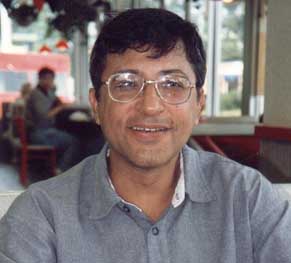SWEDISH SOUTH ASIAN STUDIES NETWORK
Meeting at Quaid-e-Azam University, Islamabad, Friday 5 December 2003:
Prof. Pervez Hoodbhoy and a colleague had organised a meeting in a seminar hall at the Central Library, where Staffan Lindberg presented the activities of SASNET. The following persons attended:
 •
Pervez Hoodbhoy, Prof. of Physics (photo to the right).
Pervez Hoodbhoy. Dr. Hoodbhoy received his bachelor's degrees in electrical
engineering and mathematics, master's in solid state physics, and Ph.D
in nuclear physics, all from the Massachusetts Institute of Technology.
He has been a faculty member at the Dept. of Physics, Quaid-e-Azam University
since 1973. Besides his professional capacity he is also one of the leading
intellectuals of the country, writing articles on current affairs in Pakistani
and International newspapers. He is chairman of Mashal, a non-profit organization
that publishes books in Urdu on women's rights, education, environmental
issues, philosophy, and modern thought. In 2003, Dr. Hoodbhoy was awarded
UNESCO’s Kalinga Prize for popularising science in Pakistan with
TV serials, and his film ”The Bell Tolls for Planet Earth”
won honourable mention at the Paris Film Festival. More
information on Dr. Hoodbhoy, with links to his articles.
•
Pervez Hoodbhoy, Prof. of Physics (photo to the right).
Pervez Hoodbhoy. Dr. Hoodbhoy received his bachelor's degrees in electrical
engineering and mathematics, master's in solid state physics, and Ph.D
in nuclear physics, all from the Massachusetts Institute of Technology.
He has been a faculty member at the Dept. of Physics, Quaid-e-Azam University
since 1973. Besides his professional capacity he is also one of the leading
intellectuals of the country, writing articles on current affairs in Pakistani
and International newspapers. He is chairman of Mashal, a non-profit organization
that publishes books in Urdu on women's rights, education, environmental
issues, philosophy, and modern thought. In 2003, Dr. Hoodbhoy was awarded
UNESCO’s Kalinga Prize for popularising science in Pakistan with
TV serials, and his film ”The Bell Tolls for Planet Earth”
won honourable mention at the Paris Film Festival. More
information on Dr. Hoodbhoy, with links to his articles.
• M. Zafar Iqbal, Prof. of Physics.
He has interacted with Prof. Lars Samuelsson,
Division of Solid State Physics,
Lund Institute of Technology, Lund University. He also mentioned the IPPF
programme at Uppsala, which had involved Pakistani researchers.
• Umar S. Qurashi, Assistant professor
of Physics
• Arif Mumtaz, Assistant professor
of Physics
• S. Khurshid, Professor of Physics
(Condensed matter)
• Abid Hameed Toor, Assistant professor
of Electronics
• Naseer Ahmad, Professor of Business
Administration, Department of Administrative Sciences
• M. Mazhar, Professor of Chemistry
• Muhammad Ishaq, Assistant professor
of Chemistry
• Razia Sultana, Assistant professor
of History. She is a specialist on Afghan history.
After my presentation, we discussed the possibilities of
sending PhD students to Sweden – a proposal put forward by Dr. Atta-ur-Rahman,
Chairman of the Higher Education Commission of Pakistan (HEC), see
our report from the meeting we had with with him at the HEJ Institute
in Karachi.
There was considerable interest in this proposal. I made it clear that
according to the Swedish university system PhD students will be recruited
independently by each department, on merit and that having a good command
of English (documented in the same way as when one applies for a International
Masters course) will be necessary.
There was some experience of sending students for a masters course to
Linköping University. Unfortunately, none of those students could
continue on the PhD level, and the funding for new masters student for
this programme had also stopped.
After 9/11 there is an increasing interest in studying
in Europe, since it has become more difficult for Pakistani students to
study in the US, and because several European countries opposed the attack
on Iraq.
We also discussed the situation in Afghanistan. There was a strong concern
about the volatility of the situation, the unholy alliance with warlord,
the lack of proper Pashtun representation in the interim government, and
the role of narcotics in the current economy of the country.
It was also claimed that the current approach to Afghanistan on account
of the Western forces was piecemeal and not holistic. You cannot just
export a particular kind of ‘democracy’ just like that. The
use of narcotics in the financing of the Jehad war on the Soviet forces
had also laid the foundation to the present difficulties to return to
a normal economy. If anything, the Taliban at least had tried to control
the narcotics economy during the government, the argument went.
There is currently a strong need to upgrade teaching and
research at Pakistan universities. Two generations of students, trained
under and after the Ziaul Haq era, have been
educated in a traditional Islamic way, that is learning by heart various
pieces of knowledge, but not to use this knowledge in a critical way.
The Higher Education Commission on its website, http://www.hec.gov.pk/,
has announced 300 professorial positions for foreign academicians, but
so far only about 80 have applied. Prof. Hoodbhoy sits in the committee
to select among these applicants.
SASNET - Swedish South Asian Studies Network/Lund
University
Address: Scheelevägen 15 D, SE-223 70 Lund, Sweden
Phone: +46 46 222 73 40
Webmaster: Lars Eklund
Last updated
2008-10-21
